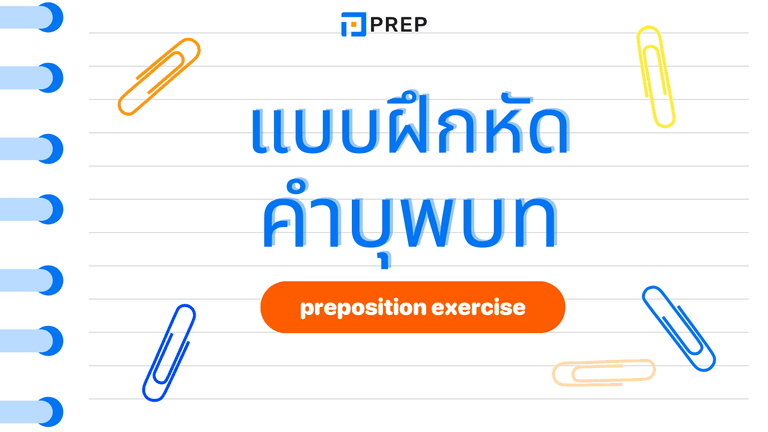3 วิธีฝึก IELTS Speaking ด้วยตัวเองอย่างไรให้มีประสิทธิภาพ
วันนี้ PREP อยากจะแบ่งปันประสบการณ์และวิธีฝึก IELTS Speaking ง่ายๆ ให้กับคุณ เป้าหมายของการเรียน IELTS Speaking ด้วยตัวเองคือเพื่อช่วยให้คุณสามารถได้ band 8.0 ในการสอบ Speaking อย่างง่ายดาย ฉันหวังว่าบทความนี้จะเป็นประโยชน์สำหรับใครที่กำลังฝึก IELTS Speaking ด้วยตัวเองที่บ้าน
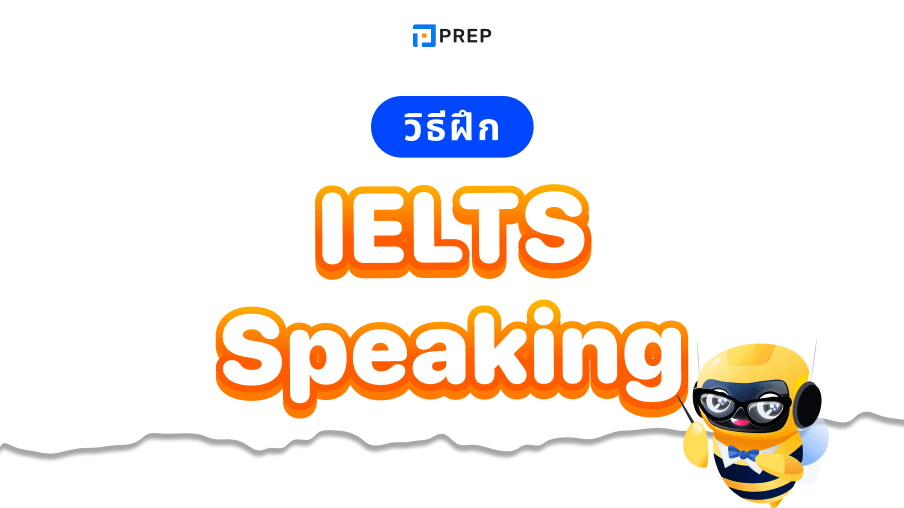
I. วิธีฝึก IELTS Speaking ด้วยตัวเอง - ตอบคำถามตามลำดับที่ถูกต้อง
สิ่งแรกที่ PREP Education อยากพูดถึงคือ หลายคนที่ได้คะแนนต่ำเช่น 4-5 มักจะตอบคำถามโดยไม่ใช้ลำดับที่ถูกต้อง "คำตอบตรงประเด็น - คำอธิบาย - ตัวอย่าง" การตอบแบบนี้อาจทำให้ผู้ตรวจสอบสับสนได้
จากประสบการณ์ฝึก IELTS Speaking ด้วยตัวเอง ไม่ว่าผู้ตรวจสอบจะถามอะไร คุณต้องตอบตรงกับคำถามอย่างแม่นยำ ตัวอย่างเช่น หากพวกเขาถามว่าคุณกำลังเรียนหรือทำงาน สิ่งแรกที่คุณควรบอกคือคุณเป็นนักเรียนที่โรงเรียนไหน หรือหากคุณทำงานแล้ว ก็บอกตำแหน่งและสถานที่ทำงานของคุณทันที
ตำแหน่งงานและสถานที่ที่คุณทำงานหรือเรียนเป็นส่วนหนึ่งของคำอธิบายสำหรับคำตอบของคุณ หากคุณให้คำตอบตรงประเด็นแล้วไม่สามารถขยายความต่อได้ ยังดีกว่าการตอบที่วนไปมาและไม่เข้าสู่ประเด็นหลัก
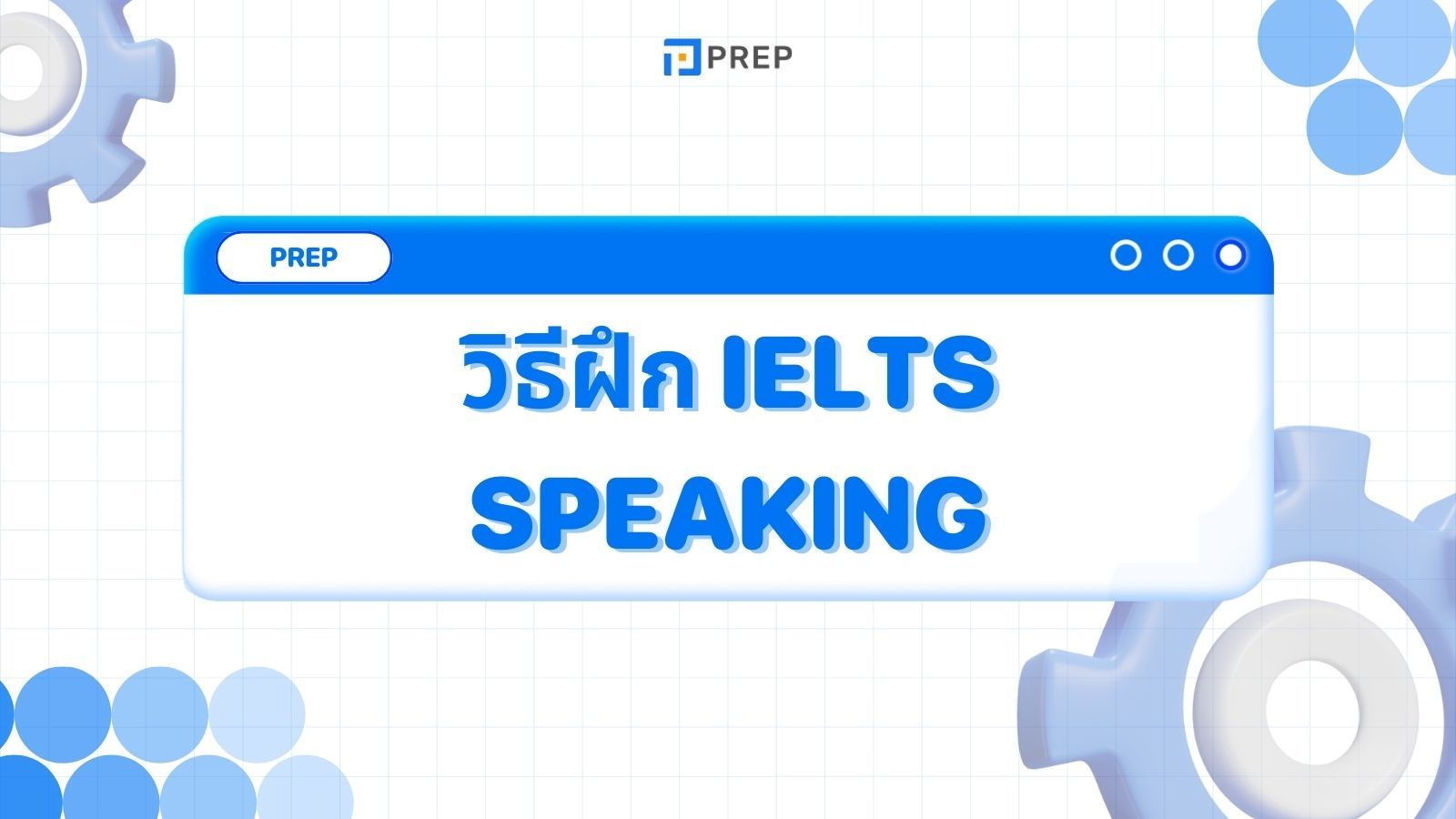
อย่างไรก็ตาม ในบางกรณี คุณอาจไม่สนใจในคำถามที่ผู้ตรวจสอบถามมา คุณสามารถตอบได้ว่า "I'm not really interested in this matter." (ฉันไม่ค่อยสนใจเรื่องนี้เท่าไหร่) แล้วให้เหตุผลตาม เช่น หากพวกเขาถามว่า "Do you like arranging flowers?" (คุณชอบจัดดอกไม้ไหม) คุณอาจตอบว่า "I'm not very interested in this job. Because at home, my mother usually does it, and during that time, I am playing football with my friends." (ฉันไม่ค่อยสนใจงานนี้ เพราะที่บ้านแม่ก็มักจะทำ และช่วงนั้น ฉันก็เล่นฟุตบอลกับเพื่อนๆ) แค่นี้ก็เพียงพอแล้ว
ดังนั้น เมื่อฝึกพูดที่บ้าน ให้ใช้วิธีการเรียนรู้ IELTS ที่มีประสิทธิภาพนี้จะช่วยให้คุณตอบคำถามได้ดียิ่งขึ้น
II. วิธีฝึก IELTS Speaking: ต้องพูดให้เป็นธรรมชาติเพื่อให้ได้คะแนน IELTS 8.0
ตามประสบการณ์ของครูผู้เชี่ยวชาญที่ PREP หากต้องการได้คะแนนแบนด์สูง 7.5+ คุณต้องมีสไตล์พูดที่เป็นธรรมชาติกับผู้ตรวจสอบ โดยเฉพาะใน Part 1 และ Part 2:
- ใน Part 1 ผู้ตรวจสอบจะถามคำถามเกี่ยวกับชีวิตประจำวันของคุณ ดังนั้นอย่าตอบซับซ้อนเกินไป พูดในสไตล์การสนทนาเหมือนกับที่คุณพูดคุยกับครอบครัวหรือเพื่อน ๆ เกี่ยวกับเรื่องนั้น ๆ จำไว้ว่า คุณกำลังสอบภาษาอังกฤษ ไม่ใช่การสอบวิทยาศาสตร์ที่ต้องละเอียดมาก
- ใน Part 2 คุณจะต้องเล่าเรื่องราวส่วนตัวในแบบที่เป็นธรรมชาติที่สุดเพื่อให้ได้คะแนนสูง ในช่วงแรกของการสอบ ให้ปิดตาแล้วนึกถึงเรื่องราวที่คุณต้องเล่าใน 30 วินาทีแรก หลังจากนั้น ใน 30 วินาทีที่เหลือ ใช้เวลาในการคิดและจดคำศัพท์ที่ดี ๆ ลงในกระดาษร่าง อย่าเสียเวลาคิดเรื่องราวหรือสร้างเนื้อหาใหม่ ใช้เวลานั้นในการรวบรวมคำศัพท์ที่เหมาะสมแทน
- สุดท้าย ใน Part 3 นี่คือโอกาสที่คุณจะแสดงความรู้และความสามารถในการพูด เพื่อให้ได้คะแนนสูง คุณต้องคุ้นเคยกับคำศัพท์เฉพาะทางในแต่ละหัวข้อทางวิชาการ คุณสามารถสะสมความรู้นี้ได้จากการอ่านหรือจากหัวข้อที่ครอบคลุมใน Writing Task 2
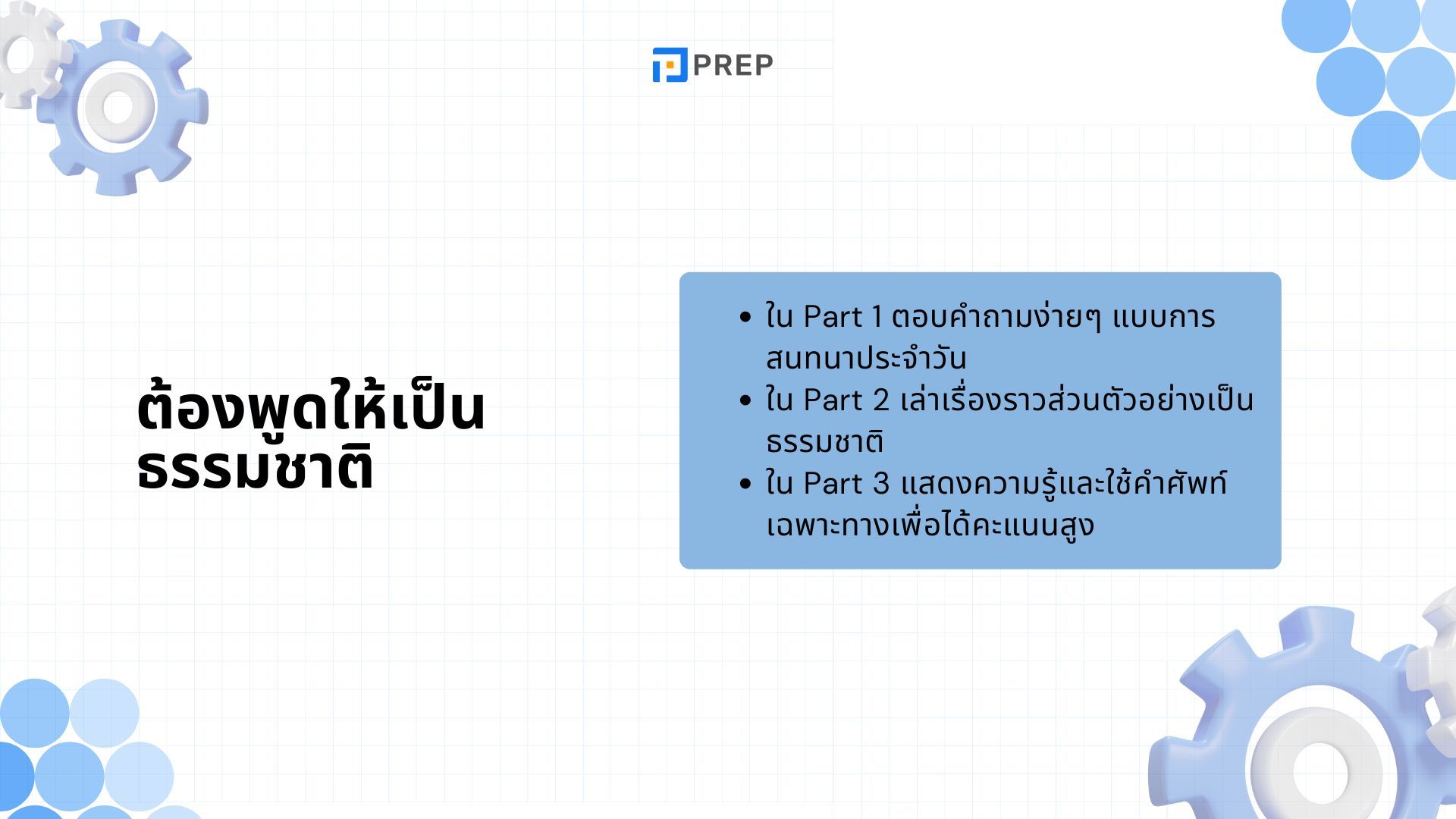
ดังนั้น ให้เริ่มต้นฝึกฝน IELTS Speaking ด้วยวิธีที่เป็นธรรมชาติ ตั้งแต่การเรียนด้วยตัวเองที่บ้าน สิ่งนี้จะช่วยให้คำตอบของคุณดูเป็นธรรมชาติและทำให้การสอบของคุณดูดีและมั่นใจ
III. วิธีฝึก IELTS Speaking: คลังคำศัพท์ที่หลากหลาย
วิธีฝึก IELTS Speaking ที่บ้านมีประสิทธิภาพคือการเพิ่มคำศัพท์ทุกวัน ซึ่งเป็นปัจจัยหลักที่จะช่วยให้คุณพัฒนาผลการทดสอบและบรรลุคะแนนแบนด์สูง หากไม่มีคลังคำศัพท์ที่ดี คุณจะไม่สามารถทำคะแนนสูงได้
คำศัพท์มีผลอย่างมากต่อคะแนน โดยเฉพาะใน Part 3 ที่ต้องใช้คำศัพท์เฉพาะทางและซับซ้อนมากขึ้น PREP แนะนำให้คุณศึกษาและฝึกฝนคำศัพท์ตามหัวข้อที่เจาะจง รวมถึงการฝึกพูดที่บ้านอย่างเป็นระบบ หลังจากมีฐานคำศัพท์ที่มั่นคง ควรฝึกใช้คำในบริบทต่างๆ เพื่อเพิ่มความมั่นใจ
เคล็ดลับที่ดีในการเรียนคำศัพท์คือการดู Ted Talks หรือวิดีโอ Academic English บน YouTube ซึ่งจะช่วยพัฒนาสไตล์การพูดให้เป็นธรรมชาติยิ่งขึ้น
หนังสือเรียนคำศัพท์ที่แนะนำ:
- Vocabulary for IELTS ของ Cambridge
- Academic Vocabulary in Use
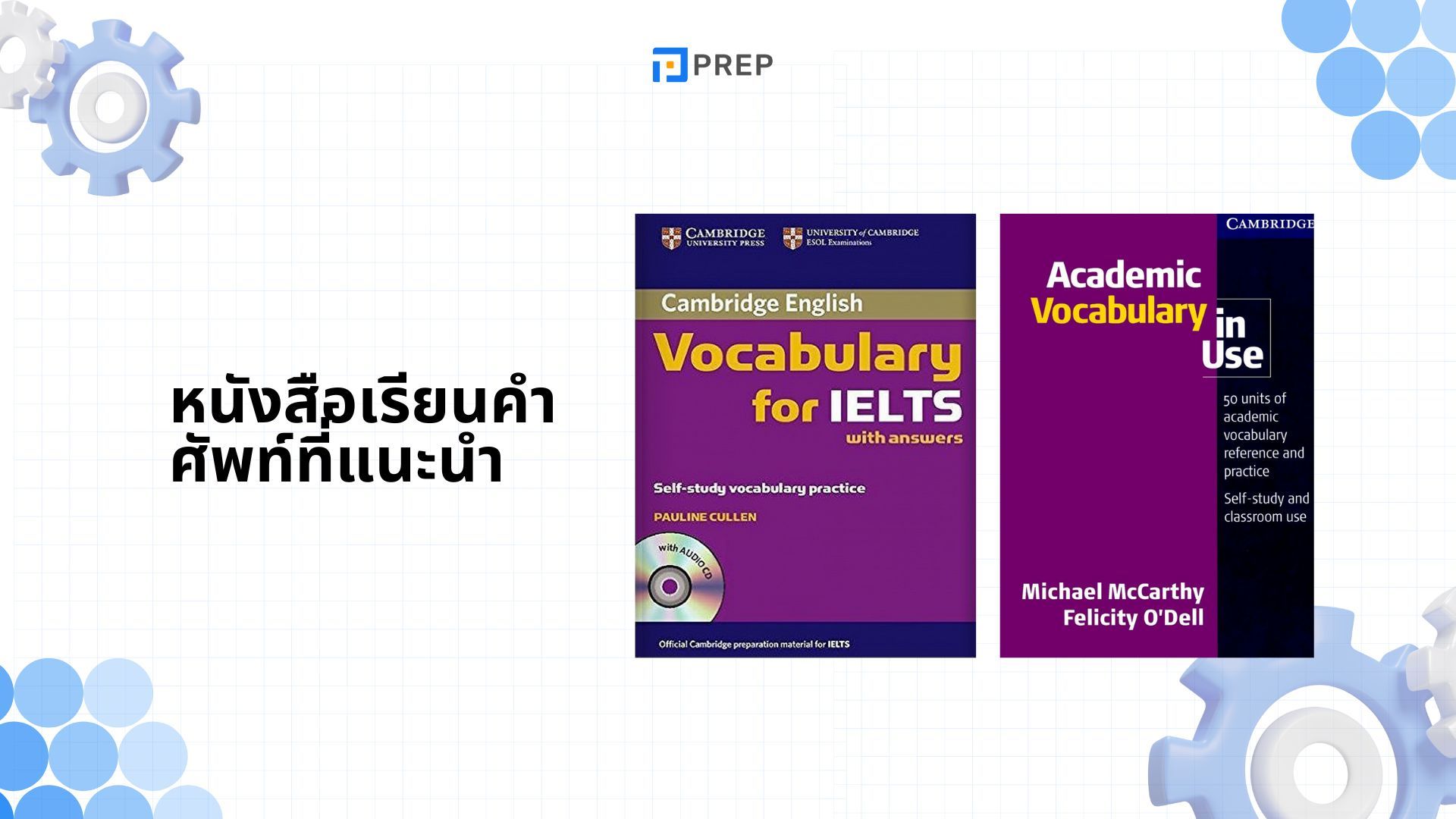
เอกสารเหล่านี้สามารถค้นหาและดาวน์โหลดได้ง่าย ช่วยให้คุณเรียนรู้และฝึกฝน IELTS Speaking ได้อย่างสะดวกที่บ้าน
หวังว่าแหล่งข้อมูลเกี่ยวกับวิธีฝึก IELTS Speaking นี้จะเป็นประโยชน์ หากต้องการคำแนะนำเพิ่มเติมหรือการสนับสนุน อย่าลังเลที่จะติดต่อ PREP เพื่อรับแผนการเรียนที่เหมาะสมตามเป้าหมายของคุณ
การเรียน Speaking ในหลักสูตรติวสอบภาษาอังกฤษ IELTS ของ PREP คุณจะได้เรียนรู้พื้นฐานการออกเสียงอย่างละเอียด พร้อมการตรวจการออกเสียงด้วย AI ที่จะช่วยชี้ข้อผิดพลาดอย่างละเอียด ด้วยการตรวจ Speaking 25 บทเรียน ครู AI จะตามติดการให้คะแนนและให้ฟีดแบ็คอย่างละเอียดตามช่วงเวลา คุณจะเห็นความก้าวหน้าอย่างชัดเจนทุกวัน ด้วยการมีผู้คอยแนะนำและปรับแก้ให้ตรงจุด นอกจากนี้ คุณยังได้ใช้ห้อง Speaking 3D AI ของ PREP เทคโนโลยี VIP ที่จะช่วยฝึกฝนความมั่นใจและการตอบโต้แบบเหมือนสอบจริง พร้อมฟีดแบ็คจาก AI ที่รวดเร็วและแม่นยำเกือบ 95% ตามสภาพสอบจริง
ติดต่อ HOTLINE +6624606789 หรือคลิกที่นี่เพื่อสมัคร! ดาวน์โหลดแอป PREP เพื่อติวสอบภาษาอังกฤษ IELTS ที่บ้านอย่างมีประสิทธิภาพ ด้วยโปรแกรมฝึกสอบออนไลน์คุณภาพสูงที่จะช่วยให้คุณทำคะแนนได้อย่างน่าประทับใจ

สวัสดีค่ะ ฉันชื่อมุก ปัจจุบันดูแลด้านเนื้อหาผลิตภัณฑ์ของ Prep Education ค่ะ
ด้วยประสบการณ์มากกว่า 5 ปีในการเรียน IELTS ออนไลน์ด้วยตนเอง ฉันเข้าใจดีถึงความท้าทายที่ผู้เรียนต้องเผชิญ แล้วก็รู้ว่าอะไรที่มันเวิร์ก
มุกอยากเอาประสบการณ์ตรงนี้มาช่วยแชร์ แล้วก็ซัพพอร์ตเพื่อน ๆ ให้ได้คะแนนที่ดีที่สุดค่ะ
ความคิดเห็น
เนื้อหาแบบพรีเมียม
ดูทั้งหมดแผนการเรียนรู้ส่วนบุคคล
อ่านมากที่สุด
ติดต่อ Prep ผ่านโซเชียล











